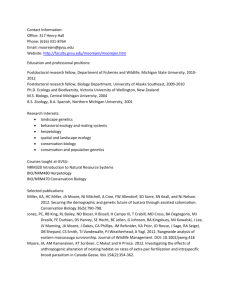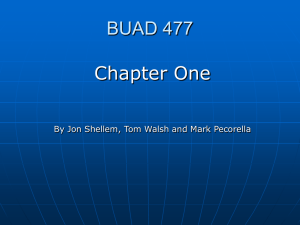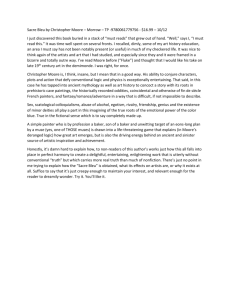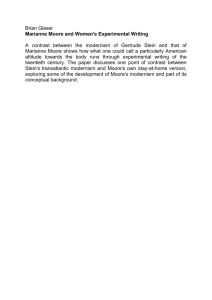J A. M ENNIFER
advertisement
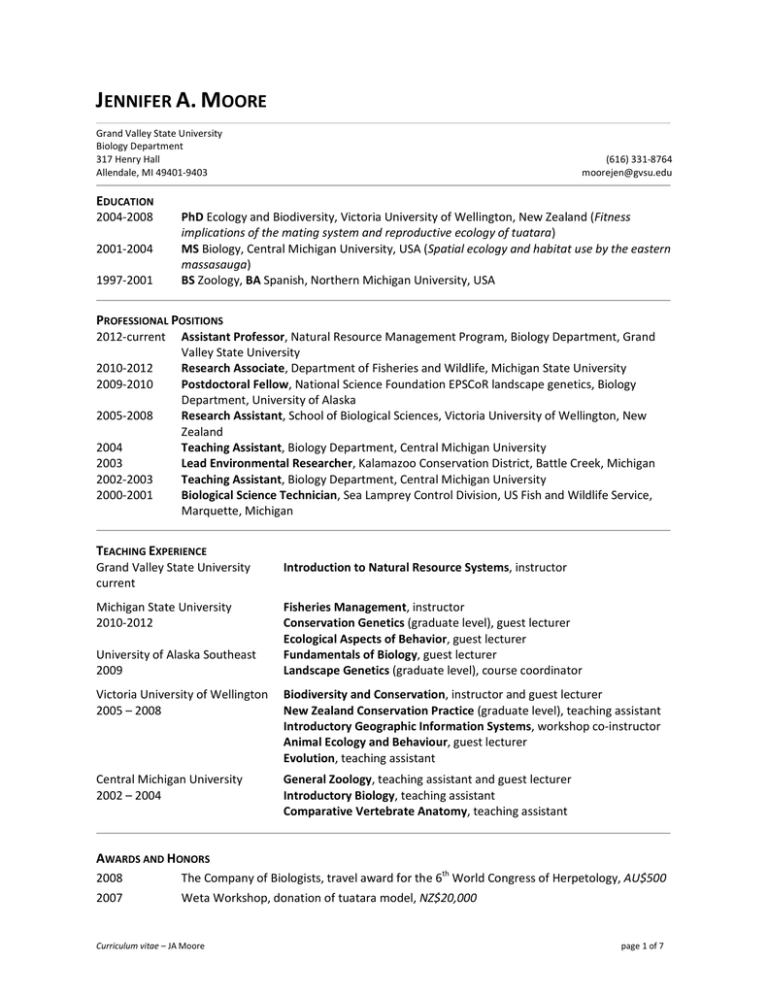
JENNIFER A. MOORE Grand Valley State University Biology Department 317 Henry Hall Allendale, MI 49401-9403 (616) 331-8764 moorejen@gvsu.edu EDUCATION 2004-2008 2001-2004 1997-2001 PhD Ecology and Biodiversity, Victoria University of Wellington, New Zealand (Fitness implications of the mating system and reproductive ecology of tuatara) MS Biology, Central Michigan University, USA (Spatial ecology and habitat use by the eastern massasauga) BS Zoology, BA Spanish, Northern Michigan University, USA PROFESSIONAL POSITIONS 2012-current 2010-2012 2009-2010 2005-2008 2004 2003 2002-2003 2000-2001 Assistant Professor, Natural Resource Management Program, Biology Department, Grand Valley State University Research Associate, Department of Fisheries and Wildlife, Michigan State University Postdoctoral Fellow, National Science Foundation EPSCoR landscape genetics, Biology Department, University of Alaska Research Assistant, School of Biological Sciences, Victoria University of Wellington, New Zealand Teaching Assistant, Biology Department, Central Michigan University Lead Environmental Researcher, Kalamazoo Conservation District, Battle Creek, Michigan Teaching Assistant, Biology Department, Central Michigan University Biological Science Technician, Sea Lamprey Control Division, US Fish and Wildlife Service, Marquette, Michigan TEACHING EXPERIENCE Grand Valley State University current Introduction to Natural Resource Systems, instructor Michigan State University 2010-2012 Fisheries Management, instructor Conservation Genetics (graduate level), guest lecturer Ecological Aspects of Behavior, guest lecturer Fundamentals of Biology, guest lecturer Landscape Genetics (graduate level), course coordinator University of Alaska Southeast 2009 Victoria University of Wellington 2005 – 2008 Biodiversity and Conservation, instructor and guest lecturer New Zealand Conservation Practice (graduate level), teaching assistant Introductory Geographic Information Systems, workshop co-instructor Animal Ecology and Behaviour, guest lecturer Evolution, teaching assistant Central Michigan University 2002 – 2004 General Zoology, teaching assistant and guest lecturer Introductory Biology, teaching assistant Comparative Vertebrate Anatomy, teaching assistant AWARDS AND HONORS 2008 2007 The Company of Biologists, travel award for the 6th World Congress of Herpetology, AU$500 Weta Workshop, donation of tuatara model, NZ$20,000 Curriculum vitae – JA Moore page 1 of 7 2006 – 2009 2005 2005 – 2008 Education New Zealand, New Zealand International Doctoral Research Scholarship, NZ$120,000 Education New Zealand, New Zealand Postgraduate Study Abroad Award, NZ$5,000 Allan Wilson Centre for Molecular Ecology and Evolution doctoral scholarship, NZ$72,000 2004 2003 2001 2000 1999 Allan Wilson Centre for Molecular Ecology and Evolution summer studentship, NZ$4,000 Central Michigan University Marion Whitney summer research scholarship, US$1,000 US Fish and Wildlife Service On-The-Spot Award for Employee Excellence Northern Michigan University, cum laude graduation honor Northern Michigan University International Language scholarship RESEARCH GRANTS AND CONTRACT WORK 2011 2009 2008 2007 2006 2005 2004 2003 WK Kellogg Foundation Research Grant, The importance of natural and anthropogenic features on deer forage use and movements: implications for disease spread and transmission to livestock, US$14,000 (Co-PI, with K. Scribner) NSF Experimental Program to Stimulate Competitive Research grant, Landscape genetics of boreal toads, US$32,000 (collaborator, with CO-PIs D. Tallmon and S. Pyare) Ecological Contractor, British Broadcasting Corporation (BBC), South Pacific series, NZ$1,200 Victoria University of Wellington, Science Faculty Research Grant, Patterns of paternity in tuatara, NZ$1,650 New Zealand Department of Conservation contract, Genetic paternity analysis of Little Barrier Island (Hauturu) tuatara, NZ$1,200 Victoria University of Wellington, Science Faculty Research Grant, Investigating the structure and transfer mechanism of tuatara sperm, NZ$1,800 San Diego Zoological Society, Institute for Conservation Research grant, What affects the fitness of tuatara?, US$10,000 (Co-PI, with N. Nelson) Victoria University of Wellington, Science Faculty small grant, NZ$1,800 Society for Research on the Amphibians and Reptiles of New Zealand, Research Award, What affects the fitness of tuatara?, NZ$1,500 Michigan Department of Natural Resources Non-game Wildlife grant, Population genetic analysis of the eastern massasauga in Michigan, US$10,000 (collaborator, with B. Swanson) Central Michigan University, Student Research and Creative Endeavors grant, Spatial ecology and habitat use by the eastern massasauga, US$500 PUBLICATIONS PEER REVIEWED 24. Miller, KA, HC Miller, JA Moore, NJ Mitchell, A Cree, FW Allendorf, SD Sarre, SN Keall, and NJ Nelson. 2012. Securing the demographic and genetic future of tuatara through assisted colonization. Conservation Biology 26(5):790-798. 23. Jones, PC, RB King, RL Bailey, ND Bieser, K Bissell, H Campa III, T Crabill, MD Cross, BA Degregorio, MJ Dreslik, FE Durbian, DS Harvey, SE Hecht, BC Jellen, G Johnson, BA Kingsbury, MJ Kowalski, J Lee, JV Manning, JA Moore, J Oakes, CA Phillips, JM Refsnider, KA Prior, JD Rouse, J Sage, RA Seigel, DB Shepard, CS Smith, TJ Vandewalle, PJ Weatherhead, A Yagi. 2012. Rangewide analysis of eastern massasauga survivorship. Journal of Wildlife Management. DOI: 10.1002/jwmg.418 22. Ramstad, KM, JA Moore, and JM Refsnider. 2012. Intrasexual aggression in tuatara: males and females respond differently to same-sex intruders. Herpetological Review 43(1):19-21. Curriculum vitae – JA Moore page 2 of 7 21. Moore, JA, AM Kamarainen, KT Scribner, C Mykut and H Prince. 2012. Investigating the effects of anthropogenic alteration of nesting habitat on rates of extra pair fertilization and intraspecific brood parasitism in Canada Geese. Ibis 154(2):354-362. 20. Moore, JA, DA Tallmon, J Nielsen and S Pyare. 2011. Effects of the landscape on boreal toad gene flow: does the pattern-process relationship hold true across distinct landscapes at the northern range margin? Molecular Ecology 20: 4858-4869. 19. Doody, JS and JA Moore. 2010. Conceptual model for thermal limits on the distribution of reptiles. Herpetological Conservation and Biology (Proceedings of 6th World Congress of Herpetology) 5(2): 283289. 18. Nelson, NJ, JA Moore, S Pillai, and SN Keall. 2010. Thermosensitive period for sex-determination in the tuatara. Herpetological Conservation and Biology (Proceedings of 6th World Congress of Herpetology) 5(2): 324-329. 17. Godfrey, SS, JA Moore, NJ Nelson, and CM Bull. 2010. Social network structure and parasite infection patterns in a territorial reptile, the tuatara (Sphenodon punctatus). International Journal for Parasitology 40: 1575-1585. 16. Herrel, A, JA Moore, E Bredeweg, and NJ Nelson. 2010. Sexual dimorphism, body size, bite force and male mating success in tuatara. Biological Journal of the Linnean Society 100: 287-292. 15. Moore, JA, T Grant, D Brown, SN Keall and NJ Nelson. 2010. Mark-recapture accurately estimates census for tuatara, a burrowing reptile. Journal of Wildlife Management 74(4): 897-901. 14. Godfrey, SS, JA Moore, NJ Nelson, and CM Bull. 2010. Unravelling causality from correlations: revealing the impacts of endemic ectoparasites on a protected species (tuatara). Parasitology 137: 275-286. 13. Moore, JA, CH Daugherty and NJ Nelson. 2009. Large male advantage: phenotypic and genetic correlates of territoriality in tuatara. Journal of Herpetology 43(4): 570-578. 12. Miller, KA, NJ Nelson, HG Smith and JA Moore. 2009. How do reproductive skew and founder group size affect genetic diversity in reintroduced populations? Molecular Ecology 18: 3792-3802. (featured in Molecular Ecology’s News and Views section) 11. Moore, JA, CH Daugherty, SS Godfrey and NJ Nelson. 2009. Seasonal monogamy and multiple paternity in a wild population of a territorial reptile (tuatara). Biological Journal of the Linnean Society 98: 161170. 10. Miller, HC, JA Moore, NJ Nelson, and CH Daugherty. 2009. Influence of MHC genotype on mating success in a free-ranging reptile population. Proceedings of the Royal Society of London, B 276: 1695-1704. 9. Miller, HC, JA Moore, FW Allendorf, and CH Daugherty. 2009. The evolutionary rate of tuatara revisited. Trends in Genetics 25 (1):13-15. 8. Moore, JA, HC Miller, CH Daugherty, and NJ Nelson. 2008. Fine-scale genetic structure of a long-lived reptile reflects recent habitat modification. Molecular Ecology 17: 4630-4641. 7. Chapple, DG, MN Hutchinson, B Maryan, M Plivelich, JA Moore, and J. S. Keogh. 2008. Evolution and maintenance of colour pattern polymorphism in Liopholis (Squamata: Scincidae). Australian Journal of Zoology 56: 103-115. 6. Refsnider, J, JA Moore, and H Streby. 2008. Sphenodon punctatus (Common tuatara): Prey detection. Herpetological Review 39(3): 347-348. 5. Moore, JA, BD Bell and WL Linklater. 2008. The behavior in conservation debate: New Zealand integrates theory with practice. Bioscience 58 (5): 454-459. 4. Moore, JA, NJ Nelson, SN Keall, and CH Daugherty. 2008. Implications of social dominance and multiple paternity for the genetic diversity of a captive-bred reptile population (tuatara). Conservation Genetics 9 (5):1243-1251. 3. Moore, JA, JM Hoare, CH Daugherty and NJ Nelson. 2007. Waiting reveals waning weight: monitoring over 54 years shows a decline in body condition of a long-lived reptile (tuatara, Sphenodon punctatus). Biological Conservation 135: 181-188. 2. Moore, JA and S Godfrey. 2006. Sphenodon punctatus (common tuatara): Opportunistic predation. Herpetological Review 37(1): 81-82. Curriculum vitae – JA Moore page 3 of 7 1. Moore, JA and JC Gillingham. 2006. Spatial ecology and multi-scale habitat selection by a threatened rattlesnake: the eastern massasauga (Sistrurus catenatus catenatus). Copeia 2006 (4): 742 -751. MANUSCRIPTS IN REVIEW 1. Moore, JA, HM Draheim, D Etter, S Winterstein and KT Scribner. Negative density-dependent dispersal in American black bears (Ursus americanus). Proceedings of the Royal Society of London, B, In Review. 2. Leafloor, JO, JA Moore and KT Scribner. A hybrid zone between Canada geese (Branta canadensis) and cackling geese (B. hutchinsii). Auk, In Review. 3. Refsnider, JM, CH Daugherty, SS Godfrey, SN Keall, JA Moore, and NJ Nelson. Nesting migrations by Stephens Island tuatara: patterns and potential costs. Biological Journal of the Linnean Society, Submitted. 4. Kropiewnicki, R, YM Lee, JA Moore and BJ Swanson. Habitat fragmentation, population isolation, and inbreeding in Michigan’s Eastern Massasauga Rattlesnake. Copeia, In Review. PUBLISHED ABSTRACTS 1. Moore, JA and JC Gillingham. 2005. Spatial ecology and habitat use by the eastern massasauga rattlesnake (Sistrurus catenatus catenatus). New Zealand Journal of Zoology 32: 227-228 (Abstract). TECHNICAL REPORTS AND POPULAR ARTICLES 1. Moore, JA, NJ Nelson and CH Daugherty. 2006. Paternity analysis of juvenile tuatara (Sphenodon punctatus) on Little Barrier Island (Hauturu). Unpublished report, New Zealand Department of Conservation, Auckland. 2. Moore, JA. 2005. The Dating Game – How Do Tuatara Choose Their Mates? The Allan Wilson Centre Newsletter 3 (September 2005). 3. Swanson, BJ, JC Gillingham and JA Moore. 2005. A genetic evaluation of the eastern massasauga (Sistrurus catenatus catenatus) in Michigan. Unpublished report, Michigan Department of Natural Resources, Lansing, Michigan. 4. Moore, JA. 2004. Black Rattlesnakes: Is It In Their Genes? Toronto Zoo Rattlesnake Tales 17 (1). STUDENT SUPERVISION 2010-2011 2010-2012 Paige Howell Hope Draheim 2011 2009 James Dupuie Catherine Frock 2008 Jennifer Vinton 2006-2007 Katie McKenzie 2006 Monica Gruber Community landscape genetics of mesocarnivores (MSU PhD, mentor) Effects of the landscape on gene flow and connectivity of Michigan’s black bears (MSU PhD, mentor) Landscape genetic analysis of bobcats (MSU undergraduate, mentor) Distribution and infection patterns of chytrid fungus affecting boreal toads of SE Alaska (NSF Research Experience for Undergraduates at UAS, advisor) Avian species abundance and richness in a variably urbanized landscape in Wellington city, New Zealand (VUW BSc honours, mentor) Returning tuatara to the New Zealand mainland (VUW MSc, co-advisor with Nicola Nelson) Effectiveness of head-starting as a conservation tool for tuatara (VUW BSc honours, mentor) PROFESSIONAL ACTIVITIES SOCIETY MEMBERSHIPS American Society of Ichthyologists and Herpetologists (ASIH), American Society of Naturalists (ASN), Animal Behavior Society (ABS), International Association of Landscape Ecology (IALE) 2012, Society for Conservation Biology (SCB), Society for the Study of Amphibians and Reptiles (SSAR), Society for Research on Amphibians and Reptiles of New Zealand (SRARNZ) 2004 – 2008 Curriculum vitae – JA Moore page 4 of 7 SERVICE Ad hoc reviewer 2009 2008 2006-2008 2006 2005 2003-2004 2003 2002 Biological Conservation, Biological Journal of the Linnean Society, Biology Letters, Conservation Genetics, Copeia, Ecology, Herpetological Journal, Integrative Zoology, Molecular Ecology, Pacific Conservation Biology, PLoS One National Center for Ecological Analysis and Synthesis (NCEAS) Distributed Graduate Seminar - Developing Best Practices for Testing Landscape Effects on Gene Flow, workgroup participant Biology Scholarships Training Day participant, Victoria University College of Education Tuatara Recovery Group, workgroup participant Joint meeting of the Ecological Societies of New Zealand and Australia, organizing committee member Victoria University of Wellington Ecology and & Evolution seminar series, co-organizer Victoria University of Wellington, graduate student representative for Biology faculty search committee Eastern Massasauga Candidate Conservation Agreement, workgroup participant Central Michigan University, graduate student representative for Biology faculty search committee Central Michigan University, Biology Graduate Student Association, secretary Volunteer, Green anaconda population biology research, Venezuela INVITED AND SYMPOSIUM PRESENTATIONS • • • • • • • • Moore, JA. 2012. A case study of conservation management down under: New Zealand’s iconic tuatara. Distinguished Alumnus, Graduate Student Recruitment weekend, Central Michigan University. (Invited) Doody, JS and JA Moore. 2008. Environmental gradients in traits affecting offspring fitness in water dragons. 6th World Congress of Herpetology, Manaus, Brazil. (Symposium - Reproduction in Reptiles: From Genes to Ecology) Moore, JA, HC Miller, NJ Nelson, and CH Daugherty. 2008. Competition, mate choice, and genetic compatibility in tuatara (Sphenodon punctatus). 6th World Congress of Herpetology, Manaus, Brazil. (Symposium - Reproduction in Reptiles: From Genes to Ecology) Miller, KA, JA Moore, NJ Nelson. 2008. Translocation and the maintenance of genetic diversity in tuatara (Sphenodon). 6th World Congress of Herpetology, Manaus, Brazil. (Symposium - Herpetofaunal Reintroductions, Translocations, and Supplementations) Moore, JA, NJ Nelson, SN Keall, and CH Daugherty. 2007. Multiple paternity in an ancient reptile: Case study of tuatara on Little Barrier Island. Parasites, Conservation, and Evolutionary Ecology conference. Flinders University, Adelaide, Australia. (Invited) Moore, JA, NJ Nelson and CH Daugherty. 2006. The mating system and reproductive ecology of tuatara. Australian Research Council reptile parasite workshop, Brisbane, Australia. (Invited) Moore, JA, JC Gillingham and BJ Swanson. 2004. Population genetics of the eastern massasauga in Michigan. Eastern Massasauga Candidate Conservation Agreement Workgroup, Michigan, USA. (Invited) Moore, JA. 2003. Spatial ecology of the eastern massasauga in Southern Michigan. Eastern Massasauga Candidate Conservation Agreement Workshop, Michigan, USA. (Invited) SELECTED CONFERENCE PRESENTATIONS • • Moore, JA, HM Draheim, DR Etter, SR Winterstein, KT Scribner. 2012. Leaving home: factors affecting natal dispersal in American black bears. US-International Association for Landscape Ecology (IALE) 2012 Annual Symposium, Newport, Rhode Island. Draheim, HM, JA Moore, KT Scribner, DR Etter, SR Winterstein. 2012. Applications of graphs to black bear source-sink dynamics. US-International Association for Landscape Ecology (IALE) 2012 Annual Symposium, Newport, Rhode Island. Curriculum vitae – JA Moore page 5 of 7 • • • • Draheim, HM, KT Scribner, JA Moore, SR Winterstein, and DR Etter. 2011. Individual-based analysis of landscape effects on gene flow and connectivity of black bear (Ursus americanus) in Michigan’s Northern Lower Peninsula. Evolution 2011, Norman, Oklahoma. Moore, JA, JK Nielsen, S Pyare, and DA Tallmon. 2010. Landscape effects on gene flow and connectivity of a widespread amphibian at the northern range margin. 24th Annual Meeting of the Society for Conservation Biology, Edmonton, Alberta. Nelson, N, K Miller, H Miller, S Keall, and J Moore. 2010. Can we effectively conserve tuatara in the face of climate change? 24th Annual Meeting of the Society for Conservation Biology, Edmonton, Alberta. Moore, JA, J Nielsen, D Tallmon, and S Pyare. 2010. Effects of the landscape on gene flow and connectivity of boreal toads. Alaska EPSCoR All-Hands Meeting 2010, Fairbanks, Alaska. • Miller, KA, HC Miller, JA Moore, SN Keall, and NJ Nelson. 2009. Securing the demographic and genetic potential of tuatara: an experimental design for assisted colonization. 22nd Australasian Wildlife Management Society Annual Conference, Napier, New Zealand. • Moore, JA, CH Daugherty, SS Godfrey, and NJ Nelson. 2009. Love on the rocks: seasonal monogamy, multiple paternity, and large-male advantage in tuatara. 2009 Joint Meeting of Ichthyologists and Herpetologists. Portland, Oregon, USA. Miller, HC, JA Moore, NJ Nelson, and CH Daugherty. 2008. Do MHC genes influence mate choice in reptiles? Genetics Society of Australasia, Adelaide, Australia. Miller, HC, JA Moore and CH Daugherty. 2007. MHC diversity and mate choice in an archaic reptile. 11th Congress of the European Society of Evolutionary Biology, Uppsala, Sweden. Ramstad, KM, JA Moore, and JM Refsnider. 2007. Fierce females: variation in intrasexual aggression among tuatara. 11th Congress of the European Society of Evolutionary Biology, Uppsala, Sweden. (poster) Porter, G, JA Moore, K McKenzie, and NJ Nelson. 2007. Density dependence in the mating system of tuatara, threatened reptiles of New Zealand. Society for Conservation Biology – Australasia, Sydney, Australia. Moore, JA, NJ Nelson, SN Keall, and CH Daugherty. 2007. Multiple paternity in an ancient reptile. Evolution 2007, Christchurch, New Zealand. Miller, HC, JA Moore, and CH Daugherty. 2007. Evolution of MHC genes in tuatara. Evolution 2007, Christchurch, New Zealand. Ramstad, KM, JA Moore, and JM Refsnider. 2007. Fierce females: variation in intrasexual aggression among tuatara. Evolution 2007, Christchurch, New Zealand. (poster) Godfrey, SS, JA Moore, CM Bull, and NJ Nelson. 2007. Social connectivity and parasite dynamics in tuatara (Sphenodon punctatus). Wildlife Disease Association International Conference, Estes Park, Colorado, USA. Moore, JA, NJ Nelson, and CH Daugherty. 2006. The social mating system of tuatara (Sphenodon punctatus). Joint meeting of the Ecological Societies of New Zealand and Australia, Wellington, New Zealand. Godfrey, SS, JA Moore, CM Bull, and NJ Nelson. 2006. Host-parasite ecology of tuatara (Sphenodon punctatus). Joint meeting of the Ecological Societies of New Zealand and Australia, Wellington, New Zealand. Moore, JA, NJ Nelson and CH Daugherty. 2006. Is bigger better? The social mating system of tuatara (Sphenodon punctatus). Joint Meeting of Ichthyologists and Herpetologists, New Orleans, USA. Godfrey, SS, CM Bull, JA Moore, and NJ Nelson. 2006. The ectoparasites of tuatara (Sphenodon punctatus). Annual Meeting of the Australian Society of Herpetologists, Healesville Sanctuary, Victoria, Australia. Moore, JA, NJ Nelson and CH Daugherty. 2005. What affects the fitness of tuatara? Annual meeting of the Allan Wilson Centre for Molecular Ecology and Evolution, Wellington, New Zealand. Moore, JA, NJ Nelson and CH Daugherty. 2005. Are tuatara polygynous? Investigating the mating system of an endangered reptile. Animal Behavior Society, Snowbird, Utah, USA. • • • • • • • • • • • • • • Curriculum vitae – JA Moore page 6 of 7 • Moore, JA and JC Gillingham. 2005. Spatial ecology and habitat use by the eastern massasauga rattlesnake, Sistrurus c. catenatus. ASH/SRARNZ/FiSH Joint Meeting, Springbrook, Australia. • Moore, JA and JC Gillingham. 2004. A rattlesnake’s tale: spatial ecology and habitat use by the eastern massasauga, Sistrurus c. catenatus. Michigan Academy of Sciences, Michigan, USA. SELECTED OUTREACH AND MEDIA COVERAGE POPULAR MAGAZINES Hansford, D. 2007. Robot Reptile ‘Released’ Into Wild to Aid Breeding Research. National Geographic News Online (http://news.nationalgeographic.com/news/2007/06/070606-robot-reptile.html) Hansford, D. 2007. A Tale of Tuatara. New Zealand Listener, July 14-20 2007. Raffaele, P. 2002. In the Realm of the Anaconda. Reader’s Digest NEWSPAPERS 2008 New Zealand Herald, Dominion Post, Waikato Times, New Zealand Press Association, coverage of tuatara research 2007 Reuters, coverage of tuatara PhD research (Global warming threatens New Zealand ‘dinosaurs’, K. Takada) New Zealand Education Review, Dominion Post, New Zealand Herald, coverage of tuatara PhD research 2004 Detroit Free Press, coverage of eastern massasauga research (Transmitters track snakes’ every move, M. Wendland) TELEVISION 2009 Victoria University of Wellington television commercial (marketing ad featuring my research for VUW’s ‘Get Amongst the Best’ campaign) 2008 Catalyst (Australian Broadcasting Corporation – Sydney, Australia) 2007 TVOne News (Television New Zealand, Wellington, NZ) 2006 Micaela’s Wild Challenge (Two Hand Productions, UK) 2004 Inside CMU, CMU Minute (Central Michigan University Broadcasting, MI, USA) RADIO 2009 Radio New Zealand live interview, Summer Noelle Series, 8th Jan 2009 2008 Radio New Zealand interview, Our Changing World FILM 2006 Big Science Adventures “The Living Past” (Royal Society of New Zealand), secondary school film competition featuring tuatara research Curriculum vitae – JA Moore page 7 of 7

